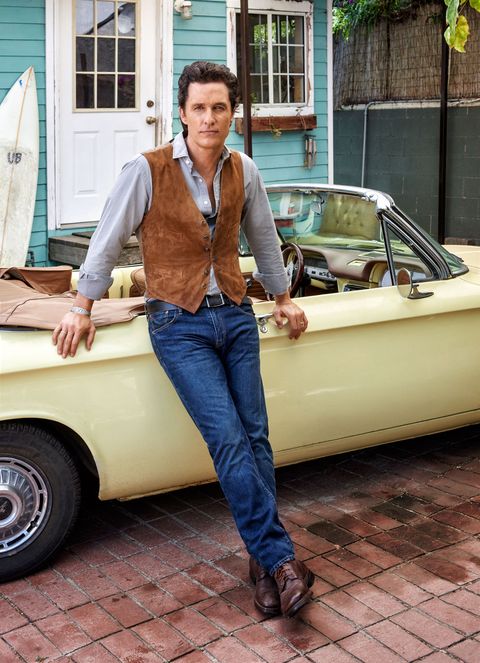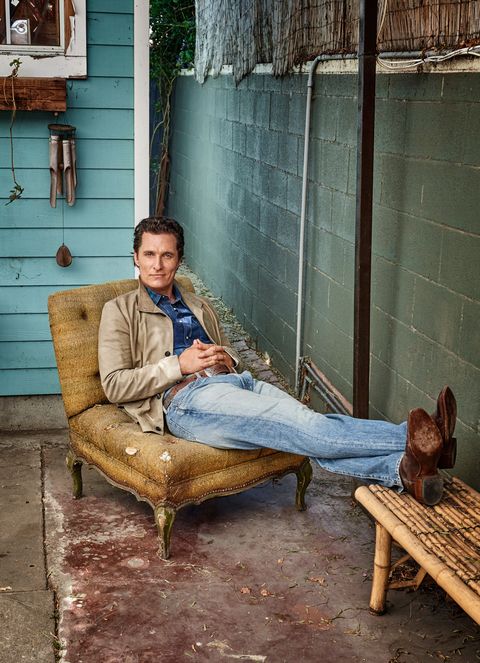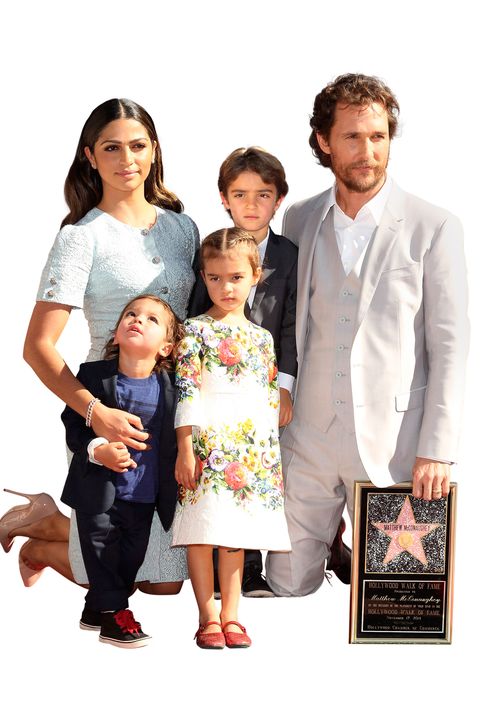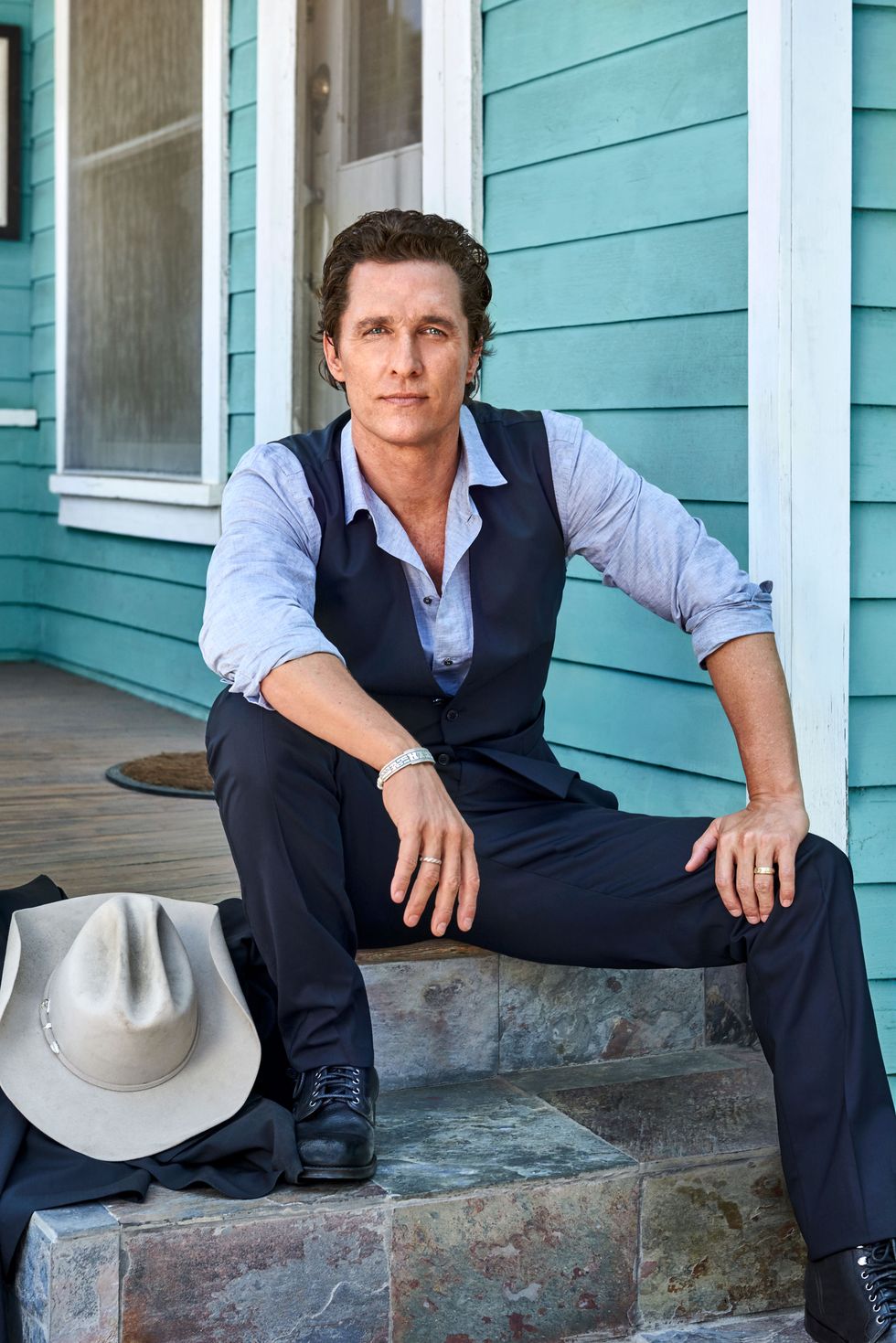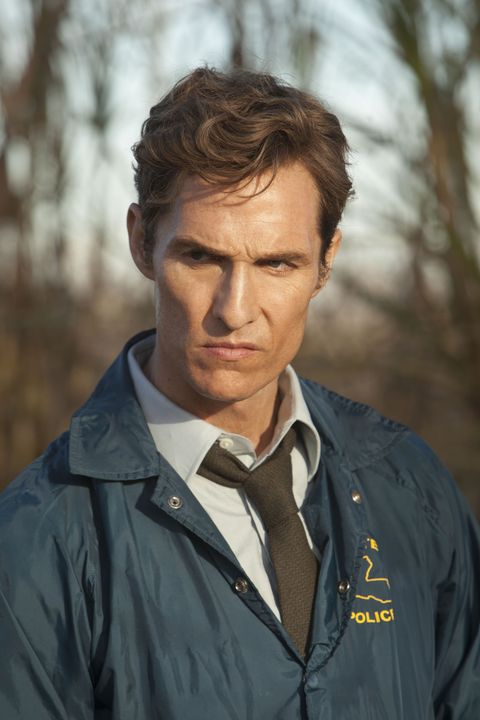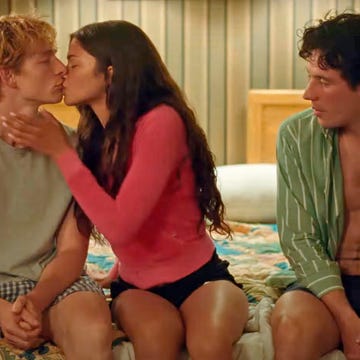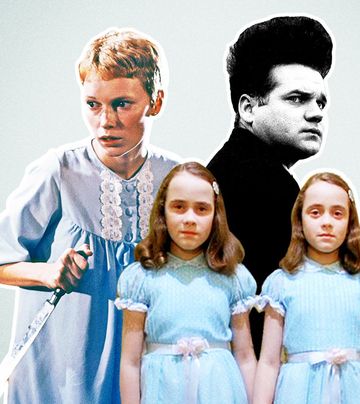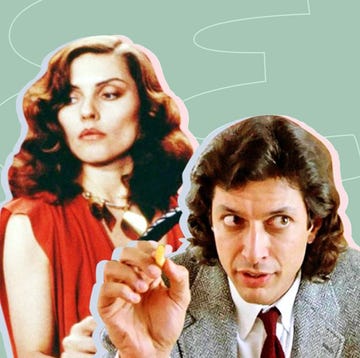We're on barstools inside a Hollywood joint on Vine. The Sassafras Saloon. The vibe is 1930s Deep South. Wicker furniture, a lot of dark wood, and potted ferns like you'd find hanging on a Charleston veranda. It's 4:00 p.m. and doors don't officially open till 5:00, so except for the sounds that come with the staff doing its thing to prepare for that evening's crowd—a bucket of ice being dumped into a sink, the clinking of freshly cleaned glasses as they're returned to a shelf—the bar is quiet.
McConaughey suggested we meet at the Sassafras. The manager let us in early, saying it was the least he could do after all the time and money McConaughey spent here shooting a TV commercial for Wild Turkey bourbon. This past summer, the Academy Award–winning actor signed a deal to be the Kentucky distillery's creative director and brand ambassador.
McConaughey picked the Sassafras as our meeting spot because he's no fool; he knows what can make or break a brand. He learned the hard way, with his own career. He made his brand, broke it, and then made it again. He'll get to that story in a bit. Suffice it to say, the dude has learned enough to know that in choosing this bar, he's done all he can to ensure that Wild Turkey will get some product placement here.
Truth is, if we were talking about any other A-list Hollywood star, this commercial business wouldn't be worth a mention. Happens all the time. Samuel L. Jackson is out there for Capital One; George Clooney has done TV spots for Nespresso. But this is Matthew McConaughey we're talking about, and the forty-six-year-old's decision to assume the role of Mr. Wild Turkey says a lot about who he is, especially considering the shit he's taken over his other product-pitchman gig.
Since 2014, McConaughey has starred in an ad campaign for Lincoln. You've probably seen the commercials. It's like the ads were whipped up by some creative who got "inspired" after downing a few bottles of cough syrup. In one of the TV spots, McConaughey's in a luxury SUV, driving down a desert road and talking to himself: "I've been driving a Lincoln since long before anyone paid me to drive one. I didn't do it to be cool. I didn't do it to make a statement. I just liked it." Evidently, you're supposed to ignore the fact that he was paid to say precisely that. In another, he serves up some watered-down Chicken Soup for the Soul: "Sometimes you gotta go back to actually move forward. . . ."
You've almost certainly seen the spoofs. On YouTube, a little girl cruises down a sidewalk in a pink Barbie jeep, musing, "I've been driving a Barbie cawr since long before anybody paid me to drive one. . . ." On SNL, Jim Carrey got behind the wheel and did his best McConaughey: "Sometimes you gotta go back to move forward. . . . I mean, take a biiiig step back, like go from winning an Oscar to doing a car commercial."
Oooof.
In the wake of the razzing, you can see why McConaughey made sure his deal with Wild Turkey gives him control as creative director. There's no need to pussyfoot around the Lincoln ads with McConaughey. He is very much like the self-aware and charmingly candid characters he's often played throughout his career. As we drink our beer, all I've got to do is mention the ads and he cuts to the chase: " 'You just won an Oscar. What are you doing, doing a Lincoln commercial?' " And without pause he cuts to his answer:
"Fuck that.
Because I'm going to.
And I like 'em . . ."
In his tone, you can hear that McConaughey ain't mad. Really. He'd be the first one to tell you he's got nothing to complain about; he's got a sweet life. The way he sees it, somebody fighting cancer—that's a real problem. This Lincoln stuff, that's "false drama." He's just sayin'.
". . . and they pay well.
And they allow me to go and do these other little movies for a lot less."
Little movies like Dallas Buyers Club, the 2013 film based on the true story of Ron Woodroof. As he read the script, McConaughey fell in love with the complexity of the character. A womanizing, homophobic Texas electrician and rodeo cowboy diagnosed with HIV in 1985, Woodroof took on the FDA to improve HIV patients' access to more effective drugs. He embarked on this crusade not out of altruism but as a self-serving prick of an entrepreneur.
A Texan himself, McConaughey thought, "I know that guy who when the doctor tells you in 1985 that you've got AIDS, those are fightin' words: What'd you say?! I'll whoop your ass. You calling me a faggot? I knew that guy." McConaughey was willing to do damn near anything to play Woodroof. Small-budget production? No problem. Hell, yeah, he'd take one-eighth of his regular $7 million price—and as he said, the financial loss would be offset by those checks from Lincoln.
Dallas Buyers Club was nominated for six Academy Awards, including Best Picture, and he earned his first Oscar for his performance. So if you want to bust his balls over those commercials, if you want to question his judgment, well, go right ahead, and he'll go right ahead doing anything he believes in.
Just like he did in 2012, when he was the first actor to sign on to True Detective. He heard a lot of "Man, it's TV. Do you really want to do TV?" He considered how going from big screen to little screen would be perceived for all of about eight seconds and decided, "This story is fucking great. Yes." True Detective (season one, anyway) became one of the most critically acclaimed TV series of all time. In 2014, the same year he won the Academy Award, he was nominated for a Golden Globe for his work as Rustin Cohle.
Afterward, McConaughey did two films that seemed like smart Hollywood-connect-the-dots ways for the Oscar winner to have another "serious" hit. But that's so not what happened. There was Free State of Jones, a $50 million period piece. McConaughey played a former Confederate medic who leads an army of deserters and slaves against the Confederacy. Released this past summer, the film got creamed by critics and had a measly $8 million opening weekend. In August, The Sea of Trees, directed by Gus Van Sant, who was nominated for Oscars for Milk and Good Will Hunting, rolled into theaters and did even worse. McConaughey starred as one of two suicidal men who meet in a Japanese forest where people go to kill themselves. The film was booed at Cannes. In its first week of release, it barely broke $3,000.
Which brings us to Gold, McConaughey's latest film. The story is loosely based on the true events of a mid-1990s mining scandal, in which the Canadian company Bre-X Minerals sent its penny-stock price soaring with the claim it had discovered vast gold deposits in Indonesia, a claim that turned out to be false. To get into the role of Kenny Wells, a floundering speculator who believes he's found his eureka moment, McConaughey shaved his head, developed a gut, and generally did a marvelous job of transforming himself into a schlub.
The Weinstein Company—as in the savvy, successful brothers Harvey and Bob—is behind Gold, and the way things go in Hollywoodland, the fact that they have chosen a Christmas Day release date means they have high hopes for the movie and/or they've got a lot riding on it. McConaughey certainly does.
By the time he signed on, the script had been circulating through the Town for at least five years. Directors Michael Mann and Spike Lee were attached and then unattached. Christian Bale considered the role. There was scuttlebutt that there might not be enough there there. But McConaughey felt a connection to Gold. He doubled down, not only investing his Oscar star power—then still untarnished by Free State of Jones and The Sea of Trees—but, for the first time, enlisting as a major feature-film producer, to ensure he had creative control.
As far as those who questioned his decision, well, you can guess Mr. Wild Turkey's thoughts on the matter.
The bartender asks if we want another. McConaughey looks at the clock. His mom, Kay McConaughey—or, as friends and family lovingly call her, "K-Mac"—is in town, visiting from Texas. Tonight, he's taking K-Mac to see Fleetwood Mac. McConaughey's eighty-one-year-old mom likes to rock, and then some. "I do not remember the last time when we partied when she didn't go to bed after me and get up before me," he says. "She's gonna want to jam on some Kendall-Jackson [wine] tonight." McConaughey decides he's got time, and he's got a driver. . . . We'll have another round.
So about the Oscar and the whole what-did-winning-it-mean-to-him question. Look, first he wants you to know it wasn't like he walked off the stage that night with the statuette and rushed to a private room where he kissed it. As a matter of fact, he put Oscar on a beam above the living room of his Malibu home, where he lives with his wife, Camila, and their three children. There the little guy stands among his high school golf awards. But if you're asking if he felt a certain amount of validation: You bet.
"I didn't grow up acting. I don't enjoy thespian, Hamlet-ian talks. I was the first frat boy in the University of Texas film school who wore button-down denim shirts, boots, and a buckle when all the Gothic artists were all in black. I went to see the big Hollywood pictures at the cineplex that everyone else in film class shat on. And for a while I thought maybe you really do need to wear all black and stay out of the sunlight and only see independent films to be an artist. I still have moments with acting where I'm like, I'm getting away with it. Winning the Oscar was validation, the respect of my peers."
Getting Away With It. If there were a movie made of McConaughey's life until that Oscar, that might make for a nice title.
He enrolled at UT in 1989, figuring he'd go to law school. But he wasn't feeling it. He was having long phone conversations with a pal of his at NYU's film school who sounded a hell of a lot more jazzed about film than McConaughey was about the law. McConaughey began to think about a career in movies. He read The Greatest Salesman in the World, which said something about your life "beginning today." He switched to film school; he got an agent; he wore a pager to class to stay on top of auditions.
He landed a couple commercials, one for the Austin American-Statesman. It didn't hurt that he had the looks. In high school, he was voted "Most Handsome." Being the die-hard UT football fan that he is, he loved his line for the newspaper ad: "How else am I gonna keep up with my Horns?"
Incredibly, he got his Hollywood break during his junior year; even more incredible is how. So he's at an Austin hotel bar in 1992. He gets to talking to a guy named Don Phillips. Turns out Don is a casting director. McConaughey tells him he's in film school and wants to direct, but mostly they talk about life and golf. After the two of them get pretty good and shitfaced on vodkas, they get thrown out—a decision McConaughey protests, telling the manager, "I thought this was a bar!" Don is impressed; he tells the kid that he's in town casting for a movie and McConaughey might be right for a part.
The movie was Dazed and Confused, about a Texas high school in 1976 as the school year winds down and summer begins. The role, which of course McConaughey got, was that of Wooderson, a dope-smoking, good-time-lovin', skirt-chasing charismatic and lovable cheese dick with a cheesy mustache who has already graduated but still hangs around the high school because he can't get enough of them high school girls. As McConaughey's Wooderson famously puts it, "I get older; they stay the same age."
Of the forty-six characters McConaughey has played in the past twenty-four years, Wooderson remains one of two he's felt most connected to. He based Wooderson on his oldest brother, Michael, whom everyone calls Rooster.
"I'm in the back of my mom's car when Mom's going to high school to pick up my brother. I'm eleven. We pull into the high school, and I see my brother leaning against the wall in the smoking section, smoking, knee up, looks eight feet tall and cooler than James Dean. When my parents went out of town, my brother let me drive his Z28, air induction on the hood. We'd listen to Mellencamp and we'd listen to Nugent. AC/DC never sounded better than that. That's Wooderson."
McConaughey stole the picture, sealing the deal in one of the closing scenes. Wooderson and a bunch of the kids are hanging out in the middle of the football field after a night of partying. They're beginning to sober up and are pondering the hangover of the rest of their lives. Director Richard Linklater turned to McConaughey and asked him to improv with a line that picks everyone up, that draws the film together. No pressure. McConaughey said to him, "It's all about livin', isn't it?" The director said, yeah, that sounded right. And so, standing on the field, surrounded by his bummed-out pals, Wooderson says, "You just gotta keep livin', man. L-I-V-I-N."
Next thing you know, he's doing a screen test for the starring role of Jake Brigance in A Time to Kill, based on the John Grisham novel. At that point, three Grisham novels had been made into movies, all with holy-shit-bona-fide stars in leading roles: Tom Cruise in The Firm; Julia Roberts and Denzel Washington in The Pelican Brief; Susan Sarandon in The Client.
Director Joel Schumacher and Grisham both had spent a year searching for their Brigance. According to Schumacher, the whole film hinged on a climactic speech Brigance gives to a jury. Schumacher was blown away by McConaughey's screen test. Grisham, too: When the author saw the tape, he called Schumacher and said, "Who is this guy? He's unbelievable." McConaughey sums it up: "A Time to Kill and boom! I got famous real quick."
As he remembers it, the Friday morning of A Time to Kill's opening weekend, McConaughey was being offered one out of every one hundred scripts. The Monday after the film opened, he was being offered ninety- nine out of every one hundred scripts.
He did a couple films that seemed like smart bets for building on the momentum of A Time to Kill. He did Contact, and then Amistad. McConaughey didn't play the lead in either, thinking they were both opportunities to learn and grow. Neither film did especially well. Then came The Newton Boys and EDtv; both bombed. His star-power stock plummeted.
McConaughey says he got "wobbly for a while." It was the late nineties, and he was no longer thought of for the roles he wanted. He was becoming a regular in the tabloids and gossip columns; more famous, or perhaps infamous, for partying, walking the beach shirtless, dating starlets, and having a good time, maybe too much of a good time. In October 1999, he was arrested after cops found him playing bongos in the wee hours of the morning, allegedly baked and unquestionably buck naked. The charge of possession of marijuana was dropped.
Onscreen, he was becoming "rom-com" eye candy—seemingly typecast, as his characters in movies like How to Lose a Guy in 10 Days, Failure to Launch, and Fool's Gold were, well, a little wobbly and generally needed to grow up and get their shit together. "All of a sudden," McConaughey says, "I understood, whoa, that's become my brand." In 2008, after wrapping Ghosts of Girlfriends Past, McConaughey made what he describes as a "conscious decision" to "unbrand."
McConaughey's plan to unbrand—really, pretty much the only thing he had planned at that point—was to disappear. Being the charismatic "Most Handsome" Texas boy who liked to party had gotten him his big break. But now he recognized he had become a caricature of himself. His brand had gotten in the way of who he was, or, at least, in the way of who he had the potential to become.
He envisioned lying low, hoping the Town would forget what he wanted forgotten and then remember what he wanted remembered. He'd reemerge when people started wondering, "Where is McConaughey? He's a good actor. What's he been up to?" He wanted to fade until he became "somebody's new good idea." He figured two years ought to do it.
Now, mind you, this not-working plan wasn't easy on McConaughey. He wanted to be in the game and he wanted the ball. So he was antsy. You take yourself out of the game for a while and you just might find yourself on the sidelines forever. McConaughey had rightly reckoned he was going to get twitchy around the house. And the person he was going to rely on the most during this period was also the person he might very well drive the most crazy during this period: his girlfriend, Camila.
Camila. Summer of 2006, McConaughey's in a nightclub on Sunset. He's very single and he ain't looking. As he puts it with a smile, "I was catching lots of green lights, man." Anyhow, he's in the nightclub, and—go figure—he's the only cat wearing flip-flops with a kerchief wrapped around his head. He and three of his buddies are in a booth where McConaughey is making margaritas. Yeah, yeah, there are bartenders who could make margaritas, but dude, McConaughey makes better margaritas.
He's cutting up his lime and in comes this woman in a green dress, and out loud he blurts, "What is that?" From across the club, he shouts for her to come over and have a margarita. She smiles and continues on her way to join a couple of her girlfriends. McConaughey thinks to himself, Boy, this isn't the kind of girl you wave across the fuckin' room at. Get your ass up and go over there.
He goes across the room, introduces himself, and invites them all over. Only Camila accepts. Camila Alves reveals she's a model from Brazil—McConaughey is not surprised. She speaks Portuguese, and lucky for him, he speaks pretty decent Spanish, and that night, goddamn if he didn't speak the best Spanish of his life.
When they began dating, McConaughey was in the midst of leaving his Malibu bachelor pad in favor of an Airstream trailer. With the Airstream hooked to his pickup, he traveled the country, mostly setting up camp in Golden, Colorado.
From there, he would just pick up and go see the Colts play or Roger Clemens pitch. As he and Camila got serious, McConaughey leased Lot No. 8 at a Malibu trailer park; as they got really serious, he leased Lot No. 7 and got a second Airstream for Camila. When they knew for sure it was for sure, they downsized to McConaughey's Airstream in Lot 8 . . . and then to a house in Malibu, which is where they were in 2008 when he told Camila about his plan to unbrand. Her reaction was all that a man could hope for. She hugged him and said, "Do it."
McConaughey pauses on that moment: "A good woman gives a man courage and confidence—the courage to have the confidence to go and do it, to not be worried as much or consider as much what the rest of the world thinks."
As empowering as Camila's support was, McConaughey got another boost: That same year, he and Camila celebrated the birth of their first child. As McConaughey puts it, "Out comes this screaming little life with a pair of balls." They named him Levi, a biblical twist on the name Matthew. The timing of Levi's birth couldn't have been better for McConaughey, as the not working and the unbranding were just under way; being a new father was a magnificent way to spend his days and fortified his professional resolve. "Man is never more masculine than after the birth of his first child," he says. "I don't mean in a macho way. I mean in terms of giving a man strength."
About eighteen months into the unbranding, McConaughey took the lead in The Lincoln Lawyer, playing an attorney who finds himself handling a rape case that forces him to reevaluate just about everything. The movie, as many of the reviews noted, allowed McConaughey to remind everyone he could act.
His performance in The Lincoln Lawyer was enough to make him somebody's new good idea. And not just any somebody.
Academy Award–winning director and Hollywood legend William Friedkin offered him the lead in 2012's Killer Joe, as a lawman who works as a hitman on the side. The production came with the pressure of a potential comeback, or not, for Friedkin, who hadn't had a hit since The French Connection and The Exorcist in the 1970s.
Whether Killer Joe was enough to reinvigorate Friedkin's career is debatable; however, McConaughey unquestionably shined.
The unbranding phase was over. McConaughey had reemerged and rebranded by being forgotten and then remembered, by doing nothing and then doing what he had always been capable of doing. His phone started to ring again. Director Jeff Nichols called him for Mud; Steven Soderbergh rang him for Magic Mike. McConaughey played the coke-snorting broker in The Wolf of Wall Street. Then came Dallas Buyers Club and True Detective.
The show's creator, Nic Pizzolatto, had McConaughey in mind for the role of Martin Hart. McConaughey wanted the role of Hart's partner, Rustin Cohle. Whereas Hart might have ten wheels turning in his head, Cohle had ten thousand. That was a challenge McConaughey was itching to take on. Pizzolatto granted him his wish.
There's a scene in season one of True Detective in which Cohle is being interviewed by two cops. Chain-smoking and polishing off a six-pack, he says, "I know who I am. And after all these years, there's a victory in that." If anyone understood what Cohle meant, it was McConaughey.
As we finish our beers, the bartender appears with two shots of tequila. McConaughey looks at his watch and calculates that he's got a little more time before he hits the Fleetwood Mac concert with his mom.
McConaughey had said that Wooderson is one of two characters he has felt the most intense connection to. So who is the other?
"Kenny Wells, man."
Wells is the role he plays in Gold. In the film, Wells is the speculator who drives the effort to unearth the gold, motivated not so much by money as by redemption and adventure. Wells is an Everyman big dreamer, a hustler, the ultimate wildcatter, just like McConaughey's dad, "Big Jim."
Although Big Jim McConaughey made a pretty nice life for himself and K-Mac and their three boys—Michael, Patrick, and the baby, Matthew—selling pipe to the oil operations in Texas, McConaughey's "Pop" was always looking for a deal, the shadier the better. "I mean, if it was a straight deal," McConaughey says, "he just didn't want to have anything to do with it."
As with that image of his brother that inspired Wooderson, McConaughey's got one of his Pop that shaped his Kenny Wells: McConaughey's nineteen and it's Christmas Eve. Weather is gray; skies are sleeting. At two in the afternoon, Pop says to McConaughey, "Let's go get some stocking stuffers." They drive up Highway 59, exit, and pull behind an abandoned shopping mall. There's a white van. The van flashes its headlights. Pop flicks his. McConaughey's thinking, Whatever this is, this is cool.
Pop pulls up to the van, tells his boy to stay in the car, and says he's going to go talk with "Chicago John." Pop gets out. Chicago John gets out. He's a little bald guy, leather jacket on, big belly. They go to the back of the van and open the doors. The van is filled with all kinds of shit: microwaves, dishwashers, even chandeliers. Chicago John pulls out this little shoe box. When Chicago John takes something out of the box, Pop starts peeling off dollars, hundreds. Pop comes back, gets in the car with something wrapped in paper towels, hands it to McConaughey, and says, "Put that in the glove compartment."
They're back on the highway. Nothing is said. All of a sudden, Pop goes, "Check the glove box and make sure it's still there." McConaughey is wondering if his Pop just bought a mongoose or something. He takes it out and unwraps the thing, and it's a watch, but not just any watch. Pop goes, "Goddamn, man, that's a $17,000 titanium Rolex and I just got it for three grand."
McConaughey knocks back his tequila. "That image came to me when I read this script. My Pop right there, that is Kenny Wells."
Listening to McConaughey, you get the sense that Big Jim not only inspired McConaughey to take on Gold but influenced McConaughey's whole life—drill to the core of McConaughey's true "brand" and you'll strike Big Jim.
Big Jim grew up in Louisiana and went to the University of Kentucky, where he met Kay. He played defensive end under Coach Paul "Bear" Bryant. After college, he made the Green Bay Packers but early in his first season was knocked out of professional football with a knee injury. It would seem that football was ideal training for Big Jim's lifelong love match with K-Mac. To hear McConaughey tell it, his mom and dad engaged in their marriage as if it were a full-contact sport.
"They were wild, man," McConaughey says. "They fought. My mom broke her middle finger four times from banging my dad in the head. I've seen her stick a water hose in his car and fill it up with water. They pulled knives. I've seen tables flip. Furniture broke."
More than a few times, McConaughey and his two brothers listened as K-Mac and Big Jim would go at each other in the kitchen and then make up—as in make love right there on the kitchen floor. With hot blood like that, it will probably come as no surprise to hear that Big Jim and K-Mac divorced and remarried—twice. "Man, I tell these stories and people might get the wrong idea; they are love stories, man," McConaughey says. "They could not live without each other."
McConaughey recognizes that there's a lot of Big Jim in him, but he dismisses the notion that bearing witness to his parents' volatile marriage might have factored into his waiting five years to pop the question to Camila. It was clear to McConaughey for a long time that Camila was the one for him. What wasn't so clear was what was so necessary about getting married. He kept asking himself, "What is it more than a signed document? What is it more than a formality? I gotta believe in this thing."
The answer, McConaughey says, came from the pastor of his church. Beginning around 2011, he and Camila started spending more time with his family in Texas. They bought a second home there. His mom was then seventy-seven. That's "fourth-quarter stuff," as he puts it, and now that he had a son and a newborn daughter, Vida, he wanted his kids to grow up in a place where "a mile feels like a mile and an hour feels like an hour." He started going to a nondenominational church, Riverbend. He liked the pastor, Dave Haney. McConaughey says it was the first time he didn't leave a church feeling guilty.
"What interests me about the Bible," he says, "is not the burning bushes, but finding the literal road maps to satisfaction, success, health . . . they are all over the Bible." Pastor Haney helped McConaughey find these road maps. "I spent a good amount of time talking about the sacrament of marriage with Pastor Haney, getting past that fear of, Am I going to lose myself? And seeing it's not now I'm one and if we marry I'm 50 percent of myself and you're 50 percent of you. No, it's one and one, and multiply and become three."
McConaughey surprised Camila with the proposal while they were visiting his family during Christmas in 2011. "I remember hitting the knee, looking into her eyes, and . . ." McConaughey's voice trails off. He looks away. Oscar or no Oscar, no one can fake the way he falls back into that moment. "I remember her face. I remember this smile coming up from her feet. I remember her having to catch her breath. And she didn't say yes right away. And then the whole family was going, Jeezus, she's gonna say no."
The couple married in 2012, after Camila grew tired of waiting for McConaughey to find downtime in his schedule and instead simply presented him with the invitation and told him, "Be there." Her whole family was there from Brazil; his whole family was there. As McConaughey looked around at his wedding, he noted that everyone was there, except for Big Jim.
McConaughey's Pop died in August 1992. Big Jim had always predicted K-Mac's lovemaking would kill him, and damned if that's not what happened: a heart attack after being with her. McConaughey was in the midst of filming Dazed and Confused. He left the set, went home for the funeral, and then returned to work, saying that's what Pop would have wanted. Richard Linklater has said he thinks Big Jim's death inspired McConaughey to come up with Wooderson's closing line: "You just gotta keep livin', man. L-I-V-I-N."
For a long while, in the wake of his Time to Kill fame, that was McConaughey's motto. It fit the McConaughey of that time, a dude who didn't spend much time reflecting.
That was then.
Now, twenty-plus years after Dazed and Confused, McConaughey hasn't abandoned his belief that you just gotta keep livin'. In fact, the charity he started in a handful of at-risk high schools around the country—after-school programs to help kids not give in or give up—is called the J. K. Livin Foundation. However, McConaughey has embraced another catchphrase—"No cheatin' the man in the glass." It's the signatory line he has set to automatically attach to his emails, the paraphrased theme of the poem "The Guy in the Glass." Depending on the source you consult, the poem was written by an unknown poet or by a guy named Dale Wimbrow.
It goes like this:
When you get what you want in your struggle for self, and the world makes you King for a day, then go to the mirror and look at yourself, and see what that guy has to say. For it isn't your Father, or Mother, or Wife, whose judgment upon you must pass. The feller whose verdict counts most in your life is the guy staring back from the glass. He's the feller to please, never mind all the rest, for he's with you clear up to the end. And you've passed your most dangerous, difficult test if the guy in the glass is your friend. You may be like Jack Horner and "chisel" a plum, and think you're a wonderful guy. But the man in the glass says you're only a bum if you can't look him straight in the eye. You can fool the whole world down the pathway of years, and get pats on the back as you pass. But your final reward will be heartaches and tears if you've cheated the guy in the glass.
"No cheatin' the man in the glass" is a sentiment that seems about right for this McConaughey, who has starred in his fair share of hits and taken his fair share of shit; a forty-six-year-old married father of three who has built a brand, broken it, and started anew; a dude who's made some mistakes but who has no regrets, because he's done it his way. Just like Big Jim, just like Wooderson, just like Kenny Wells. "For Kenny Wells," McConaughey says, "it was fourth down and fifty-five yards to go five or six times in his life. Somehow he pulled it off. And yeah, I can relate to that."

